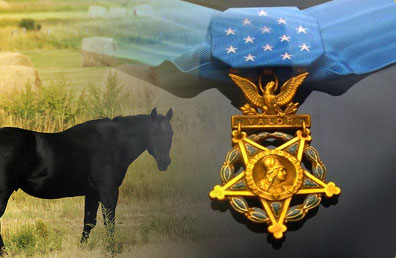
The General stopped pacing at the window to watch Blackie limp slowly into view, his left hindquarter atrophied by neurologic disease. He’d ridden that beautiful, proud horse over fences and in dressage, paralyzing local shows and pinning high in the majors. Now it had come to this, for them both —
After that dreadful night at the hotel, the General’s thoughts had imploded into the membranes of his brain, where grotesque rodents chewed on his nerve endings every day and every night, saying farewell to sleep. With clenched fists he shouted into the glass, “Oh, how reality gets warped by the chaos of living!”
A Medal of Honor awarded to his beloved son to cover up the trigger-happy actions of our own troops under the undisciplined command of their officers. John’s honorable career had earned the Medal, if not in the event.
But not the General’s —
The shock of John’s death had unleashed the rodents in his brain to gnaw away the layers of self-deception and thrust him into direct confrontation with the windy, impossibly cold crags and ridges of North Korea. The General had mercilessly pushed his troops toward the Yalu River, obsessed with fulfilling MacArthur’s command to go all the way to the Chinese border. But in mid stride — the unimaginable — withering fire tore into his men from the ridges on every side. A full Chinese division had stopped the General’s advance in its tracks.
The General had stood, oblivious in his naked exposure to fire, eyes wide with shock, his mind frozen as solid as the ice beneath his boots. “Sir! Sir!” He’d heard the frantic voice of his terrified adjutant as barely a whisper. “What do we do?”
The General raked his nails across the window, as if he could somehow claw through the glass to escape the dark, frozen curse of current reality into the sunny fields of his lost past — because at the moment, just thirty miles short of the Yalu, his troops dying before his eyes — the General had been paralyzed. During his entire combat career, he had only known how to attack. Retreat had never been an option. When it became the only option, he hadn’t known what to do.
What the General had remembered through the years was pulling his troops back, of fighting a rear action, of going it alone in the absence of Marine units on his right and left. Over and over again in the years afterward, he had grieved over the loss of his men, because the Marines had been unable to keep up the pace.
But now that the rodents had eaten away the layers of deception, the fact was he’d lost all contact with the Marines because he’d never considered communication with them to be relevant. So when he had most desperately needed communication with them, communication had been lost.
The General had failed — his men, his Army, his country. And for that he’d won the Medal of Honor. And in this cold, unflinching morning of truth, what of MacArthur? Mac had never left Tokyo, never set foot in Korea. He’d had no idea what was happening on the ground. His entire concept of the war had been a creation of his own mind, uttered with such infallibility that Army intelligence could only see it his way, despite the evidence the Marines knew all too well — masses of Chinese soldiers had crossed into North Korea. MacArthur, the great god of duty, honor, country — everything the General had believed in — had fallen into the dust like the column of an ancient Greek temple, pulling with it the remaining fabric of the General’s mind.
The General turned to retrieve the pistol from his desk. As he stepped down the hallway of the beautiful home of his retired years, he was tortured by the voices of Suzanne, of John, by the hollow echoes of his highest honor bestowed on him by a system of deception. He stepped out into the sunshine to walk steadily toward his old friend, Blackie. The time had come for them both to be put down.
Blackie limped toward him, looking for the usual apple the General had plucked from the kitchen. The General continued on down the gentle incline, Blackie at his side, familiar with his owner’s visits to the pond surrounded by willow trees that was the General’s favorite spot on earth. As the General watched the water bugs scoot across the pond’s glassy surface, sounds came to him in heightened clarity: the songs of birds, the whirring locusts, the hum of unseen insects in the grass. As Blackie lowered his head for a drink, the General pulled the pistol from his jacket. But just as he raised it, Blackie lifted his head to give the General a nudge, as if to say “Please don’t. Not yet —”
Despite the pain of his crippling disease, Blackie still wanted to live! The General didn’t have the heart to go through with it. Instead he raised the pistol to his own head, but Blackie nudged him, nudged him again harder.
“Don’t do that!”
He tossed his head, the way horses do, toward the path. As the General lowered his pistol, Blackie turned to walk slowly along the trail. When the General caught up to walk beside him, Blackie turned his head, ever so slightly, to nuzzle his cheek.
“There’s still a way for us to walk together,” he said. “Still some things for us to see.”

